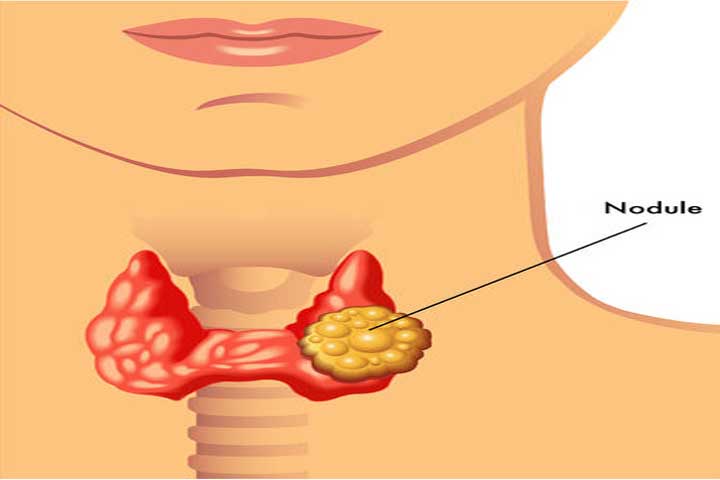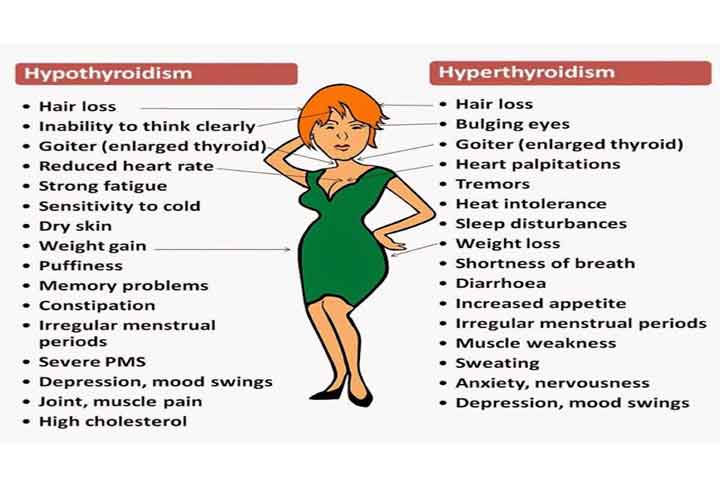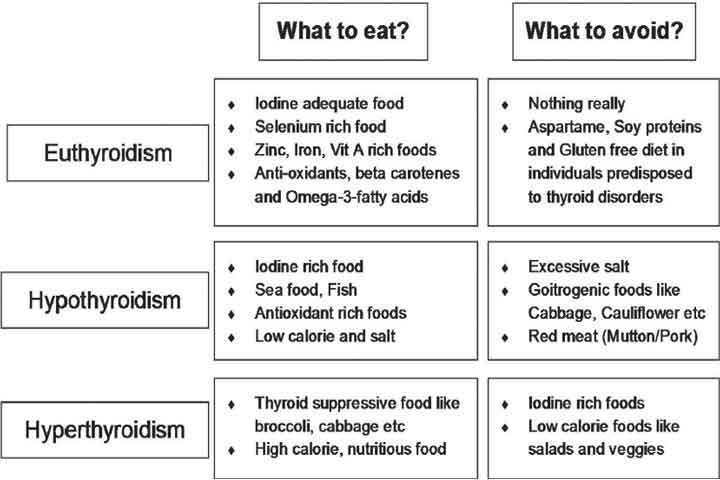
Important: This article is for informational purposes only. Please read our full disclaimer for more details.
In this fast paced world, we often tend to either neglect our health or we look for some quick remedies to fix our health issues. However, this does not benefit us in the long run. It is always advisable to opt for natural remedies which may take time to cure you but are effective in the long run.
In this post, we will enlighten you about thyroid and and give you tips on how to treat it naturally. So, let’s start by first understanding what is thyroid and its different types. A thyroid is an endocrine gland which is found at the front of your neck. It is a butterfly shaped gland which secretes thyroid hormones.
If your thyroid gland is producing too much or too little thyroid hormones, then it means that you are suffering from thyroid disorder.
What Are The Different Types Of Thyroid
1. Hyperthyroidism
If your thyroid glands produce too much of thyroid hormones like triiodothyronine and thyroxine, then it means that you are suffering from Hyperthyroidism.
2. Hypothyroidism
A thyroid disorder in which the thyroid glands do not secrete enough thyroid hormones is called as Hypothyroidism.
3. Thyroid Cancer
One of the most common type of thyroid cancer is the papillary thyroid cancer which though common is not very dangerous. Some of the other types of thyroid cancer are – follicular thyroid cancer, anaplastic thyroid cancer, thyroid lymphoma and medullary thyroid cancer.
4. Goiter
If you have an enlarged thyroid gland with nodules producing excess thyroid hormones, then you are suffering from goiter and these are not cancerous.
5. Thyroid Nodules
If you are suffering from thyroid nodules, you will have solid or fluid filled growths in your thyroid. These thyroid nodules can either be benign or cancerous.
6. Graves’ Disease
The Graves’ disease is an autoimmune disease which will cause your thyroid glands to produce excess thyroid hormones. This disease is common in women who are baove the age of 20.
7. Thyroiditis
The inflammation of your thyroid gland will result in a thyroid disease called Thyroiditis. There are different types of thyroiditis, some of which are: postpartum thyroiditis, silent thyroiditis, Hashimoto’s thyroiditis and acute thyroiditis.
Causes Of Thyroid
Below are the causes of various thyroid disorders.
- Hypothyroidism can occur due to a number of reasons like – Hashimoto’s thyroiditis, surgical removal of thyroid gland, iodine deficiency, radiation treatment, medications like lithium, amiodarone, etc.
- Hyperthyroidism is caused mainly by Graves’ disease. Other causes are thyroiditis, hyperfunctioning thyroid nodules, pituitary glands making too much TSH and excessive intake of iodine or thyroid medications.
Symptoms Of Thyroid
Below are some of the symptoms that are associated with hypothyroidism:
- Fatigue/Excessive Tiredness
- Remarkable increase in weight
- Unable to bear cold
- Muscle and joint pains
- Decrease in heart rate
- High cholesterol
- Constipation
- Visible puffiness of face, hands and feet
If these symptoms are not treated on time then it can result in serious issues like peripheral neuropathy, depression, loss of memory, slow speech, etc.
Patients suffering from hyperthyroidism will have the below mentioned symptoms:
- Swelling in the neck region
- Diarrhea
- Difficulty in breathing and sleeping
- Excess sweating
- Unable to bear heat
- Frequent urination
- Menstrual problems like light or absence of periods in women
- Increase in heartbeat
A hyperthyroidism patient may not necessarily have all of these symptoms.
Diet Plan For Thyroid Patients
As a thyroid patient, it is very important for you to take note of your food habits. There are certain food items which are necessary for your body and certain food items that have to be avoided at all costs. The food you eat can either trigger your thyroid disorder or help in controlling it. The first step before starting a diet would be to consult a physician and find out whether you are suffering from hyperthyroidism or hypothyroidism.
Scroll down as we give you a clearer picture of what you should eat and what you should avoid.
Foods To Eat For Thyroid
Hypothyroidism Patients
- Fish – The omega 3 fatty acids present in fishes like salmon, tuna, sardines, etc., are super healthy to include in your diet.
- Nuts – Indulge in some healthy snacks by keeping a stock of nuts with you. But, as always, do not over eat them.
- Antioxidant Rich Fruits And Vegetables – Including these antioxidant rich fruits and vegetables like tomatoes, bell peppers, sweet potatoes, etc., will help in controlling your weight.
- Whole Grains – Add some fiber to your diet to relieve your constipation issues. Use whole grains like oatmeal, brown rice, etc. Ensure there is at least a gap of 3-4 hours between your whole grain meals and thyroid medications.
- Dairy Products – Dairy products like curd and cottage cheese will add the missing Vitamin D and nutrients like iodine and calcium.
- Beans – Add some beans to your soups and salads and make yourself feel more energized after each meal.
- Seaweed – Seaweed is rich with iodine, calcium, fiber and vitamins which are all essential in treating your hypothyroidism.
Hyperthyroidism Patients
- Omega 3 Fatty Acids – You can control your hyperthyroidism symptoms by including omega 3 fatty acids in your diet by consuming fish, nuts, olive oil or flax seed oil.
- Protein Rich Diet – For vegetarians, you can increase the intake of beans and lentils as a source of proteins while non-vegetarians can have chicken, eggs, fish and turkey.
- Dairy Products – You require at least 3 servings of daily products everyday. You can take it in the form of milk, cheese, fortified orange juice or soy milk.
- Cruciferous Vegetables – Cauliflower, kale, broccoli, etc., are some of the cruciferous vegetables that have to be included in your hyperthyroidism diet.
- Vitamin D Rich – Hyperthyroidism will increase the speed of your bone degeneration which can be fixed by taking foods which are rich in Vitamin D.
Foods To Avoid For Thyroid
Hypothyroidism Patients
- Cruciferous Vegetables – Though these are beneficial for hyperthyroidism patients, you should completely avoid it if you are a hypothyroidism patient.
- Gluten – Gluten rich should be kept away from your diet since it does not allow proper absorption of thyroid hormones.
- Processed Foods – Cakes, bread, pretzels, pastas, etc., come under this category and they should be removed form your diet immediately.
- Soy Products – Avoid consuming soy based products as over-consuming them will increase the risk of hypothyroidism in you.
- Alcohol/Caffeine – We are all well aware of the harmful effects of alcohol and caffeine. So it goes without a saying that these should not be included in your diet.
Hyperthyroidism Patients
- Iodine-Rich Food – What works for hypothyroidism patients will not work for you. So make sure you avoid iodine-rich foods like seaweed, excess salt, fried food, etc.
- Caffeine – Since this is harmful for both the thyroid disorders, it is best to completely skip this from your diet.
- Hydrogenated Vegetable Oil – Due to the unhealthy trans fat in it, you should not include chips, donuts, packaged fried foods, etc., in your daily diet.
- High Carbohydrates – You don’t have to completely avoid this from your diet but ensure that you do not take high-glycemic carbohydrates like white flour, sugary foods, etc.
Natural Home/Herbal Remedies For Thyroid
Try out the below natural remedies to deal with your hypothyroidism disorder.
1. Coconut Oil
Ensure that you cook with extra-virgin coconut oil or add two tablespoons of coconut oil to your smoothies.
2. Apple Cider Vinegar
Make a mixture of one glass of warm water, two tablespoons of apple cider vinegar and little bit of honey. Have this mixture daily.
3. Ginger
Slices of ginger can be added to your soup or have a herbal ginger tea by adding fresh ginger slices to a cup of hot boiling water. Let it steep for sometime. For a dash of sweetness, you can add a teaspoon of honey.
4. Guggul
Please make sure that you consult with your doctor before trying out this herb. This is made out of the gum resin of Commiphora Mukul which is an Indian tree. Taken as a supplement, you can have three doses of 25 mg daily.
Try out the below natural remedies to deal with your hyperthyroidism disorder.
1. Bugleweed
This herb helps by reducing the amount of thyroid hormones. Make a herbal tea by adding half teaspoon of bugleweed in one cup of hot water. Let it steep, then strain it and have the tea.
2. Lemon Balm
Another herbal tea that you can have to treat your hyperthyroidism is the lemon balm herbal tea. Add about one teaspoon of lemon balm in one cup of hot water, let it steep for five minutes and your tea is ready.
3. Broccoli
Include this vegetable in your soups and salads on a daily basis.
4. Sea Vegetables
Sea vegetables like kelp, kombu, sea palm, etc., can be found in their dried form. You can add them in your soups, salads, pizzas, rice, etc.
5. Berries
Different berries like strawberries, cherries, blueberries, etc., can all be taken in limited quantity on a daily basis.
Essential Oils For Thyroid
Studies have proved that essential oils can help in improving thyroid disorders. Below are five essential oils that you can use.
1. Peppermint Oil
This is a very tasty oil which can be added in your daily diet. You can add a drop of peppermint oil to your glass of lemon tea.
2. Lavender Oil
Lavender oil when added in your bath or shampoo can relieve you from stress and insomnia problems which are associated with thyroid disorder.
3. Lemongrass Oil
To solve the inflammation problem caused by underactive thyroid, you can either add this to your herbal tea or you can directly apply it on the skin.
4. Rosemary Oil
Another oil which can help you with the inflammation is rosemary oil. You can use this oil directly or by adding it with other oils.
5. Grapefruit Oil
The grapefruit oil is one of the most effective oils which can help in dealing with thyroid symptoms like stress, depression, etc. Add a drop of this oil to your herbal oil.
So, here was your complete A-Z guide on thyroid disorders. We hope you use our tips and are successful in treating your thyroid problems naturally.
You Might Also Like:
- 10 Healthy Foods for Thyroid Function
- 8 Best Essential Oils for Thyroid Problems – Benefits & Uses
- The 10 Best Healthy Fat Foods That You Should Eat
- The 10 Healthy High-Fiber Foods to Add to Your Diet
- Treat And Prevent Thyroid With These 12 Yoga Poses


















